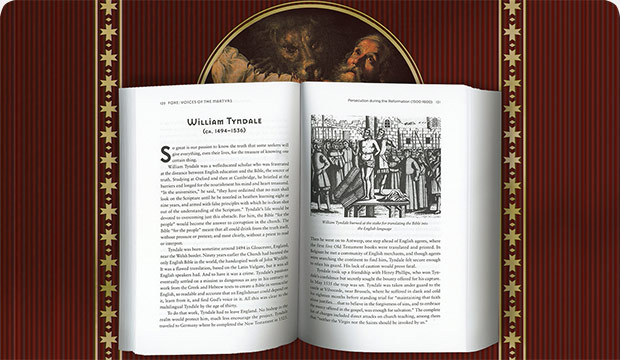|
|
persecution.com |
|
||||
|
Tyndale’s Passion: The Bible in English
|
||||
|
William Tyndale was born in late 15th-century England, about 90 years after the church had banned the only complete English Bible in the world, the translation made by John Wycliffe. Wycliffe maintained that being ignorant of the Scripture is the same as being ignorant of Christ. But his translation from the Latin Vulgate was ruled to be corrupt and heretical. By the age of 30, Tyndale had embraced Wycliffe’s vision of a Bible so readable and accurate that an Englishman could depend on it, learn from it and find God’s voice in it. With the same dangerous passion as that shown by Wycliffe, he soon undertook a new English translation directly from the Greek and Hebrew texts.
|
||||
|
||||
|
Tyndale fled to Germany to begin his translation work, as no English bishop would dare provide protection or encouragement for such a project. After completing a translation of the New Testament in 1525, he moved on to Antwerp, Belgium, staying one step ahead of the English king’s bounty hunters. But it was a friend who eventually betrayed Tyndale to authorities. In May 1535, he was arrested and held for 18 months before being tried for “maintaining that faith alone justifies … that to believe in the forgiveness of sins and to embrace the mercy offered in the gospel was enough for salvation.” Two months after being condemned as a heretic, William Tyndale was led from his prison cell to the stake. As brush and logs were piled up around his feet, he was heard praying, “Lord, open the King of England’s eyes.” The executioner then gave the rope a quick tug, strangling Tyndale before his body was consumed by the blaze. God answered Tyndale’s prayer. Two years after his death, King Henry VIII authorized the distribution of the Matthew Bible, largely composed of Tyndale’s work. Then, in 1539, the king ordered all printers and sellers of books to provide for the “free and liberal use of the Bible in our own maternal English tongue.” Tyndale’s vision had become a reality.
|
||||
|
|
This email was sent by The Voice of the Martyrs • Privacy Policy and State Disclosure Statements
|




